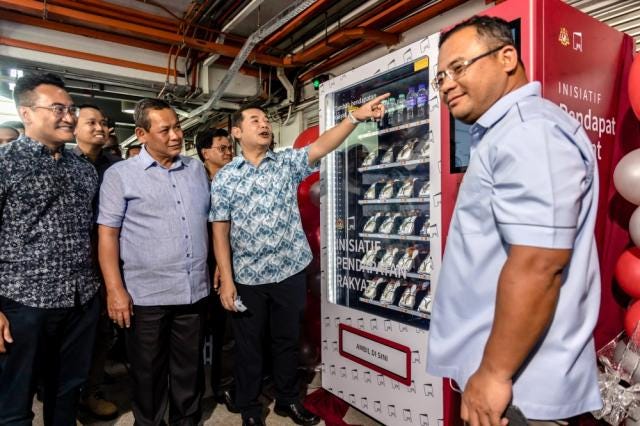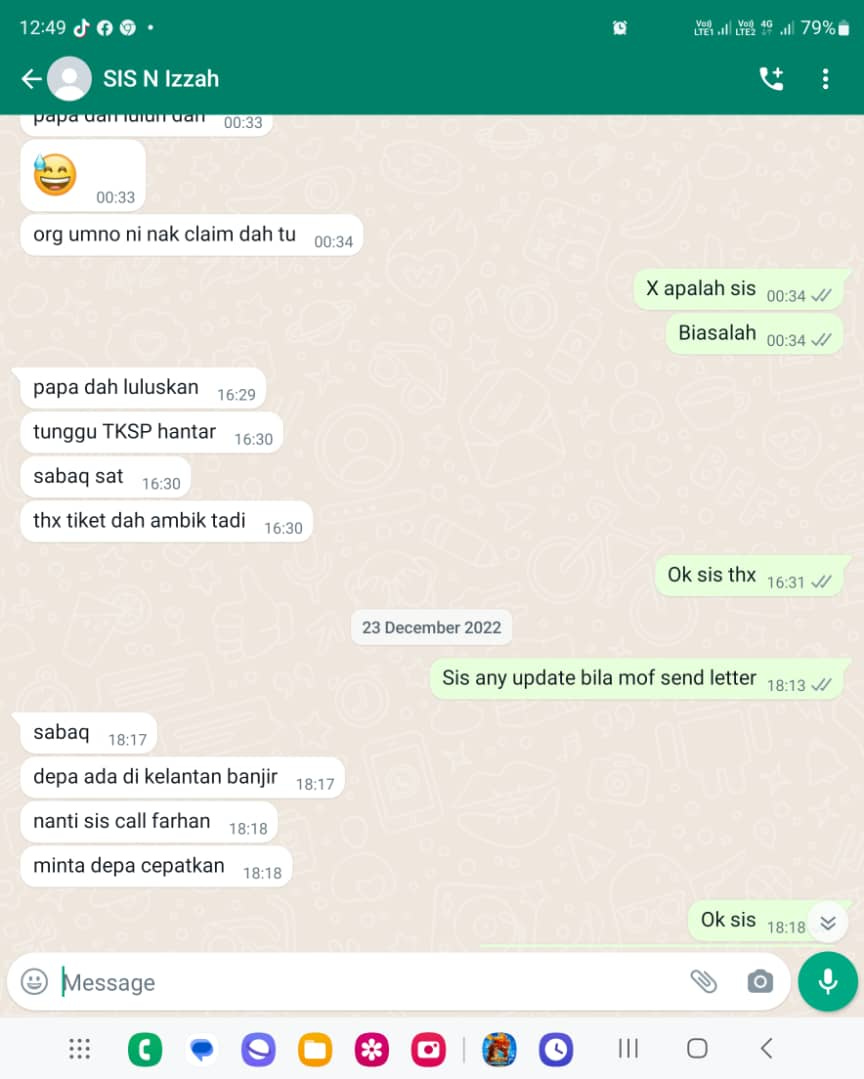Counterproductive results, cock-ups, and conflicts of interest in policy development and delivery
No change in the policy model, transparency needed to ensure policy effectiveness and prevent corruption
In an illuminating OpEd by Dr Geoffrey Williams, ‘Stop helping the poor’, a number of weaknesses on poverty eradication strategies were highlighted. Dr Williams highlighted that programs like Menu Rahmah, Inisiatif Pendapatan Rakyat (IPR), that encompass The Agro Entrepreneur Initiative (Intan), The Services Operator Initiative (Ikhsan), and the Food Entrepreneur Initiative (Insan), do not directly help the poor, nor encourage and assist the development of MSMEs.
Dr Williams gave the example of promoting RM2 nasi lemak sales through vending machines. The RM 750 million program really benefits consultants, contractors, suppliers, and middlemen rather than the target group of MSMEs and the poor.
In fact, there is evidence that the RM 2 nasi lemak program is actually taking business away from petty vendors around the vicinities of vending machines. Besides the program providing a competitive product to existing vendors, the RM 2 nasi lemak is driving prices down to a point where petty vendors will have to close up their stalls.
A quick talk to some petty vendors found great dissatisfaction that the government had assisted businesses to compete with them. One vendor argued that if they were given assistance and premium space around LRT stations, they too could sell fresh nasi lemak at RM 2 per packet.
The designers and contractors of the vending machines should refund their consulting fees to the ministry, as the vending machines have been found to have many faults. Packets are ripped inside the machines, fail to dispense properly and clog the machines. Some consumers also complain that the nasi lemak should be renamed ‘basi lemak’ because of poor machine servicing and rotation of stocks. The self-life of nasi lemak should be counted in hours and not days.
This project, along with the free sanitary napkin dispensing within health ministry offices is assisting some of the highest salaried people, rather than those in real need of assistance. It is certainly misguided and tokenistic.
Let them eat cake strategies
This indicates that the ruling parties, Pakatan Harapan in particular did not have any real vision and plan to alleviate poverty before they came to office. The people who are determining policy are well paid consulting and public relations agencies, who are certainly not working pro bono.
The effect of this policy won’t raise the incomes of those in poverty. As Dr Williams says, the beneficiaries are a network of cronies who run consultancy firms, public relations firms, fabricators and contractors.
There could not had been an effective and fair tender process building up these new supply and logistics chains in such a short time. The civil service just doesn’t work that fast.
Another concern is how all these projects are being developed, approved and dished out to various stakeholders. The finance ministry appears to be the gatekeeper. This is where all sorts of difficulties arise in transparency. One must be extra careful to ensure full transparency, so there can be no accusations of conflict of interest, favouritism, nepotism, or kleptocracy. Working pro bono will not clear anyone of these accusations. Lets hope that the snapshot below is a deep fake.
If that’s not the case, then the arrest and charging of Bersatu’s Wan Saiful Wan Jan in connection with the Jana Wibawa programme is just a another political witch-hunt.
Subscribe Below:







Kikikikikikiki!
The Economic Affairs Minister, Rafizi Ramli seems to have too much of the success of INVOKE Solutions, his data science, software engineering, application development, digital marketing and creative arts company, which offers data-driven solutions to the mass market on his mind, and which claims to have forecast the outcome of GE14 spot on, which indeed it may have.
Earlier, Rafizi came under fire for telling consumers to use the PriceCatcher mobile app developed by the Department of Statistics Malaysia (DOSM) to search its OpenDOSM database of two million prices gathered nationwide each month, to find vendors selling chicken and eggs at the lowest prices and to buy from them, so as to exert market pressure which would force those selling at higher prices to drop their prices to match the lowest in the market.
Whilst that may seem fine in principle, however what if by using the PriceCatcher app to search the OpenDOSM database, I who lives in Petaling Jaya find a box of 10 eggs sold for RM1.00 less by a vendor in Klang. Do I then hop into my car, drive along the Federal Highway all the way to that vendor in Klang, buy that box of 10 eggs for RM1.00 less, then drive back to Petaling Jaya with the eggs, whilst I had paid a lot more for petrol and the parking just to get a box of eggs for RM1.00 lower than from vendors in my neighbourhood in Petaling Jaya.
Several parties, including those who understand the poultry and egg business have said that the cost of the imported chicken feed to feed the chickens which provide the chicken meat and lay the eggs, comprises between 70% and 75% of the cost price of chicken and eggs, so the obvious way to reduce the prices of chicken and eggs would be to find cheaper sources of chicken feed and to develop cheaper forms of chicken feed, either by growing the ingredients such as the soyabeans and corn which go into them domestically, or to find alternative ingredients for chicken feed such as from the waste products of palm kernel mills.
One doesn't need to have attended the elite Malay College Kuala Kangsar residential school, subsequently have earned a degree in Electrical Engineering from the University of Leeds, UK and subsequently have qualified as a Chartered Accountant under the Institute of Chartered Accountants in England and Wales (ICAEW) to figure that out.
Whilst to me, the Agro Entrepreneur Initiative (Intan) and the Services Operator Initiative (Ikhsan) parts of the Inisiatif Pendapatan Rakyat (IPR) make sense, however the third part about selling nasi lemak through vending machines for RM2 a pack is the kind of nonsense I've heard from techno-geeks countless times in my over 28 years for writing about the ICT industry, and which I write about in my blog IT Scheiss, which is me unplugged:-
https://itsheiss.blogspot.com/
As was correctly pointed out in the article above, nasi lemak has a very short shelf-live of several hours, which make it impractical to sell through vending machines, in which they also need to be maintained at low refrigerated temperatures to maintain their freshness, perhaps even frozen, or heavily laced with preservatives, both of which would ruin the taste of nasi lemak.
Isn't it any wonder then that Rafizi's party PKR and its Pakatan Harapan allies have had little success at gaining significant traction amongst those who Sukarno referred to as the Rakyat Marhean, in the rural and semi-rural heartlands which deliver 40% of the seats in parliament, as your goodself mentioned in an earlier article, as well as gaining traction amongst the urban, lower income (B40) Rakyat Marhean, who are struggling to make ends meet.
If not for the affluent, middle-class and upper middle-class voters in Bangar, Pantai Hill Park, Kampung Pantai and Pantai Halt within the wider Lembah Pantai federal constituency, coupled with the four-way split voting results in November 2022, where PKR held Lembah Pantai with the largest minority of 46.09% of the vote, the Marhean voters especially in the Pantai Dalam part of Lembah Pantai would have defeated PKR in Lembah Pantai.
C'mon Rafizi. Get off your high horse and get to know the real world.